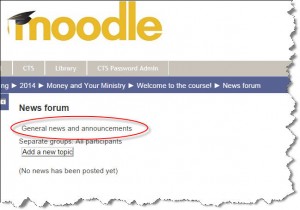I’ve found that instructors new to the online environment sometimes are not too clear about functionality of various pedagogical actions on the LMS platforms. Teacher behavior that has become intuitive in the classroom environment become a challenge when one tries to figure out “Where do I put this on my course site?” It is often helpful to (1) identify the pedagogical teacher action, and, (2) answer the question, “What function does this serve in the teaching-learning process?”
One common challenge for novice online instructors is the question of what constitutes an “announcement” (in Blackboard it’s called “Announcements” and it can have it’s own navigation menu button. In Moodle, it’s called the “News forum” whose function is “General news and announcements”). When what constitutes an announcement is not clear in the mind of the instructor, things get put on the News forum section that don’t belong, resulting in confusion for the learner.
Here are the pedagogical FUNCTIONS of announcements that are appropriate for you to place in the Bb Announcements “News forum” section:
- Direct traffic (“start here,” announcing who may move ahead in the course and who may not)
- Give timely direction (when to begin a reading assignment; when to end a discussion; directing students to address a particular student post or question)
- Updates (point to new additional readings, note changes in schedule)
- Prompts for “next steps” (provide induction transitions–ending one week’s-session and starting the next)
- Reminders of due dates and assignments (especially as the course draws to a close)
- Community news (announce seminary community events).
The rule for announcements: Anything that is current, timely, and has a short shelf life.
In contrast, the following are NOT announcements:
- Anything that’s a “set” component of your course (e.g. messages about your course expectations, norms and culture)
- Anything on your syllabus that carries over from one iteration of the course to the next
- Bibliographies
- Extended mid-course corrections to class culture issues
- Rants
- Communications that are not “didactic”.
Israel Galindo is Associate Dean for Lifelong Learning at the Columbia Theological Seminary. Formerly, he was Dean at the Baptist Theological Seminary at Richmond. He is the author of the bestseller, The Hidden Lives of Congregations (Alban), Perspectives on Congregational Leadership (Educational Consultants), and A Family Genogram Workbook (Educational Consultants), with Elaine Boomer and Don Reagan.
His books on Christian education include The Craft of Christian Teaching (Judson), How to be the Best Christian Study Group Leader (Judson), Planning for Christian Education Formation (Chalice), and A Christian Educator’s Book of Lists (S&H).
Galindo contributes to the Wabash Center’s blog for theological school deans.

